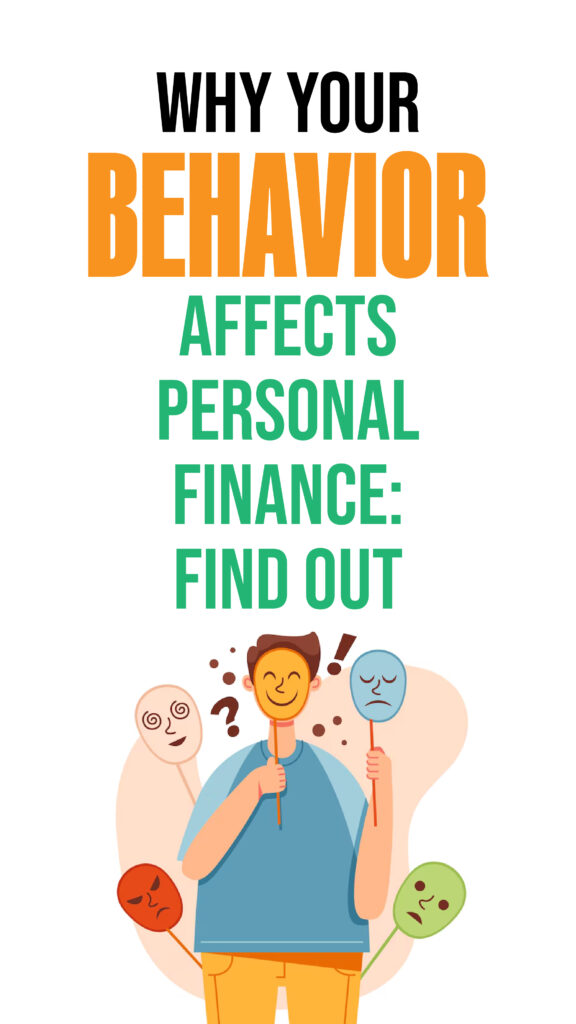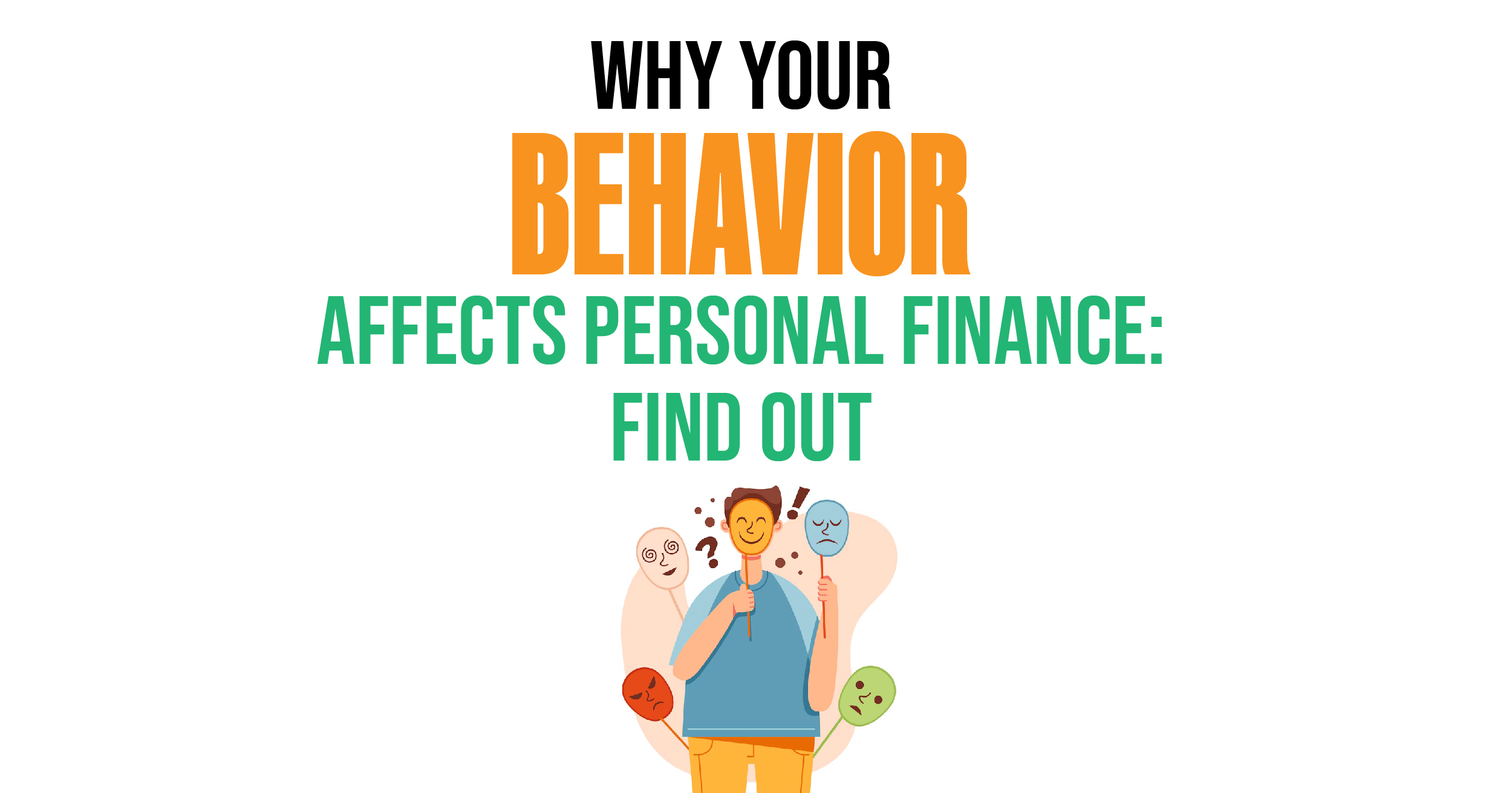Personal finance is dependent on your behavior because your spending and saving habits directly impact your financial health. Consistent, disciplined actions lead to better financial outcomes.
Effective personal finance management starts with understanding that behavior plays a crucial role. Impulsive spending can derail financial goals, while disciplined saving builds wealth. Regularly tracking expenses helps identify areas for improvement. Creating a realistic budget ensures you live within your means.
Investing wisely grows your money over time. Avoiding debt saves you from high interest rates and financial stress. Prioritizing financial education empowers you to make informed decisions. By adopting positive financial behaviors, you can secure a stable and prosperous future. Remember, good financial habits today shape your financial success tomorrow.
Personal Finance Basics
Understanding personal finance starts with the basics. Your behavior shapes your financial future. Making wise choices helps you manage money better. Let’s explore the fundamentals of personal finance.
Income And Expenses
Your income is the money you earn. This can come from a job, business, or investments. Knowing your income helps you plan your budget. List all sources of income. This will give you a clear picture of your finances.
Your expenses are the money you spend. These include bills, groceries, and entertainment. Tracking expenses helps you see where your money goes. Compare your income and expenses. This will show if you are saving or overspending.
| Income | Amount |
|---|---|
| Job Salary | $3000 |
| Freelance Work | $500 |
| Total Income | $3500 |
| Expenses | Amount |
|---|---|
| Rent | $1000 |
| Groceries | $300 |
| Entertainment | $200 |
| Total Expenses | $1500 |
Savings And Investments
Savings are the money you set aside for the future. Having a savings plan is crucial. It prepares you for emergencies and big purchases. Aim to save a part of your income every month. Start with a small percentage, then increase it over time.
Investments help your money grow. Investing wisely can provide you with additional income. Stocks, bonds, and real estate are common investments. Research each option to understand the risks and rewards. Diversifying your investments can protect your savings.
- Set clear savings goals.
- Track your progress regularly.
- Choose investments that suit your risk tolerance.
By focusing on your behavior, you can improve your financial situation. Start with the basics and build good habits. This will lead you to financial success.

Credit: www.speakaccounting.com
Behavior And Money Management
Personal finance is deeply tied to your behavior. The way you spend, save, and invest is influenced by your habits and mindset. Understanding this connection can help you manage your money better.
Spending Habits
How you spend your money affects your financial health. People with good spending habits often have more control over their finances. They make thoughtful choices and avoid unnecessary expenses.
- Impulse Buying: This habit can drain your savings quickly.
- Budgeting: Sticking to a budget helps manage your spending.
- Needs vs Wants: Prioritize needs over wants to save more.
Saving Patterns
Saving money is essential for financial security. Your saving patterns reflect your financial goals and priorities.
- Automatic Savings: Set up automatic transfers to your savings account.
- Emergency Fund: Build an emergency fund for unexpected expenses.
- Long-term Goals: Save for future goals like retirement or buying a home.
Tracking your savings can also be helpful. Here’s a simple table to illustrate how you can track your savings:
| Month | Amount Saved | Goal |
|---|---|---|
| January | $200 | $250 |
| February | $220 | $250 |
| March | $240 | $250 |
Good saving patterns can lead to financial stability. They help you be prepared for the future.
Psychological Factors
Managing personal finance is not just about numbers. Your behavior plays a big role. Psychological factors are key in how you handle money. Emotions, impulses, and habits can shape your financial health.
Emotional Spending
Emotions often drive spending decisions. Feeling sad or stressed can lead to overspending. Buying things can feel like a quick fix for bad emotions. This behavior can create financial problems. Understanding this can help you control emotional spending. Here are some tips to manage it:
- Avoid shopping when feeling down
- Find other ways to cope with emotions
- Create a budget and stick to it
Impulse Buying
Impulse buying means buying things without planning. It happens when you see something you like and buy it right away. This can hurt your budget and savings. Stores and ads often encourage impulse buying. To avoid this, follow these steps:
- Make a shopping list and follow it
- Wait 24 hours before making a big purchase
- Set spending limits for non-essential items
Recognizing these psychological factors can improve your financial decisions. It can lead to better money management and savings.

Credit: educounting.com
Impact Of Financial Education
Understanding personal finance is crucial for everyone. Financial education has a big impact on our behavior. It shapes how we manage, save, and invest our money.
Knowledge And Awareness
Financial education increases our knowledge and awareness. Knowing about finances helps us make better decisions.
With good financial education, we understand terms like interest rates and inflation. We learn about different types of investments and savings accounts. This knowledge helps us grow our money wisely.
Being aware of the importance of saving and budgeting helps in planning for the future. It reduces the chances of falling into debt.
Budgeting Skills
Financial education teaches us budgeting skills. These skills are essential for managing money effectively.
With a budget, we can track our income and expenses. It helps us see where our money goes.
Budgeting helps us save for big goals, like buying a house or car. It also helps in avoiding unnecessary expenses.
Here is a simple table showing the benefits of budgeting:
| Benefit | Description |
|---|---|
| Saving Money | Helps to save for future needs. |
| Debt Reduction | Avoids unnecessary spending and reduces debt. |
| Financial Goals | Aids in achieving long-term financial goals. |
Learning to budget makes us more responsible with our finances. It encourages us to save and invest wisely.
Building Healthy Financial Habits
Personal finance is deeply linked to your behavior. How you spend, save, and invest affects your financial health. Building healthy financial habits is essential. It helps you manage money better and achieve financial goals.
Setting Financial Goals
Setting clear financial goals is the first step to good habits. Goals give you direction and purpose. They help you stay focused and motivated.
- Define short-term goals: Save $500 in three months.
- Define long-term goals: Buy a house in five years.
- Make goals specific, measurable, and time-bound.
Tracking Expenses
Tracking your expenses is crucial for financial health. It shows where your money goes and helps you control spending.
Use a simple table to monitor daily expenses:
| Date | Item | Amount |
|---|---|---|
| 01/10/2023 | Coffee | $3 |
| 01/10/2023 | Lunch | $12 |
| 01/10/2023 | Groceries | $45 |
Review this table weekly. Identify unnecessary expenses and cut them.
Use tools like apps or spreadsheets to make tracking easier. Stay consistent and make tracking a daily habit.
Overcoming Financial Challenges

Personal finance is deeply intertwined with your behavior. Overcoming financial challenges often requires a change in habits and mindset. This section explores key strategies for tackling financial obstacles effectively.
Debt Management
Effective debt management is crucial for financial health. Start by listing all your debts. Prioritize them based on interest rates and balances. Use the debt snowball or debt avalanche methods to pay them off.
| Method | Details |
|---|---|
| Debt Snowball | Pay smallest debt first, gain momentum. |
| Debt Avalanche | Pay highest interest debt first, save on interest. |
Make sure to pay more than the minimum payments. This reduces the principal balance faster. Avoid taking on new debt during this period. Monitor your spending to stay on track.
Emergency Fund
An emergency fund is your safety net. Save at least three to six months of living expenses. This prepares you for unexpected events like job loss or medical emergencies.
- Start small, aim for $500 initially.
- Automate your savings to build the fund consistently.
- Keep the fund in a high-yield savings account.
Regularly review and adjust the fund as your expenses change. Having an emergency fund reduces financial stress. It also prevents the need to rely on credit cards or loans for emergencies.
Role Of Discipline And Consistency
Personal finance heavily depends on your behavior. The key behaviors are discipline and consistency. These traits help manage money effectively. They ensure you stick to your financial plans. They also aid in building good financial habits.
Routine Savings
Routine savings are crucial. Saving money regularly builds your financial security. Set a fixed amount to save every month. This habit helps grow your savings steadily. Saving small amounts consistently makes a big difference over time.
Automate your savings to ensure consistency. Many banks offer automatic transfers to savings accounts. This feature helps you save without thinking about it. It ensures you never miss a savings deposit.
Benefits of Routine Savings:
- Builds an emergency fund
- Helps achieve financial goals
- Reduces financial stress
Avoiding Unnecessary Debt
Avoiding unnecessary debt is vital. Debt can quickly become overwhelming. Discipline helps you avoid impulse purchases. Always ask yourself if you need the item. This simple step can prevent unnecessary spending.
Consistency in managing debt is also important. Pay off credit card balances monthly. This habit keeps your debt manageable. It also improves your credit score.
Tips to Avoid Unnecessary Debt:
- Stick to a budget
- Use credit cards wisely
- Avoid high-interest loans
Benefits of Avoiding Unnecessary Debt:
- Less financial stress
- Better credit score
- More money for savings
Long-term Financial Success
Personal finance is more than just numbers. It depends on your behavior. Your actions today shape your financial future. Understanding this can lead to long-term financial success.
Retirement Planning
Planning for retirement is crucial. Start saving early to ensure a comfortable future. The earlier you start, the more your money grows. Use a retirement account like a 401(k) or IRA. These accounts offer tax benefits and help your money grow.
Consider your future expenses. Make a list of expected costs. Plan for healthcare, housing, and daily living. Saving regularly builds a solid nest egg. Even small amounts add up over time. Stay consistent and stick to your plan.
Investing Wisely
Investing can grow your wealth. Choose investments that match your goals. Diversify your portfolio to reduce risk. Spread your money across different assets. This can include stocks, bonds, and real estate.
Research before you invest. Understand the risks and rewards. Use resources like books, websites, and financial advisors. Stay informed about market trends. Avoid making impulsive decisions.
Key points for investing wisely:
- Start early
- Invest regularly
- Diversify your portfolio
- Stay informed
- Seek professional advice when needed
Remember, your behavior impacts your financial success. Make informed decisions and stay disciplined. Small steps today lead to a secure future.

Credit: thegoodnickel.com
Frequently Asked Questions
How Is Personal Finance Dependent Upon Your Behavior?
Personal finance heavily relies on your behavior. Good habits like budgeting and saving lead to financial stability. Impulsive spending and poor planning cause financial stress.
What Percent Of Your Personal Finance Is Based On Your Behavior?
About 80% of personal finance depends on your behavior and habits, while only 20% relies on knowledge.
How Does Your Money Personality Affect Your Spending Behavior?
Your money personality shapes spending habits. Savers prioritize saving, while spenders enjoy immediate purchases. Planners budget carefully, whereas risk-takers invest aggressively. Understanding your type helps manage finances better.
How Does Personal Finance Impact Your Life?
Personal finance shapes your financial stability, reduces stress, and helps achieve life goals. It influences spending, saving, and investing habits.
Conclusion
Mastering personal finance hinges on understanding your behavior. Small, consistent actions lead to significant financial growth. Cultivate positive habits and make mindful choices. Recognize the power of your decisions and their impact on your financial future. Stay disciplined, informed, and proactive in managing your money.
Your financial success truly depends on you.

